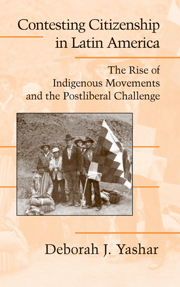 Contesting Citizenship in Latin America
Contesting Citizenship in Latin America Book contents
4 - ECUADOR: LATIN AMERICA'S STRONGEST INDIGENOUS MOVEMENT
Published online by Cambridge University Press: 05 September 2012
Summary
Ecuador claims Latin America's strongest, oldest, and most consequential indigenous movement, CONAIE. CONAIE first gained national and international notoriety in 1990 with a protest that shut down commerce for a week and forced the government to negotiate with them on several issues. By the end of the twentieth century, it had sustained this power of mobilization and parlayed it into a national force to be reckoned with when debating development policy, bicultural education, and institutional design. Moreover, several of its regional and national leaders have been elected to the national legislature and appointed to national office. Indeed, they took part in drafting the country's new Constitution in 1997–1998. Dramatically, CONAIE also helped to topple two national governments (Presidents Bucaram in 1997 and Mahuad in 2000). In a country where civil society is notoriously weak (Pachano 1996), the strength of Ecuador's indigenous movement is all the more striking.
This chapter explains the emergence of Ecuador's indigenous movements. It seeks to strike a balance between delineating the common origins of these movements and presenting the organizational stories that make these movements so unique in Ecuadorian history. Drawing on the framework outlined in Chapter 3, this chapter illustrates how the Ecuadorian state unintentionally granted pockets of local autonomy to indigenous people, only later to challenge that very autonomy through changing citizenship regimes. This change in citizenship regimes catalyzed indigenous communities to mobilize, beginning in the 1960s on through the present day.
- Type
- Chapter
- Information
- Contesting Citizenship in Latin AmericaThe Rise of Indigenous Movements and the Postliberal Challenge, pp. 85 - 151Publisher: Cambridge University PressPrint publication year: 2005
- 1
- Cited by


